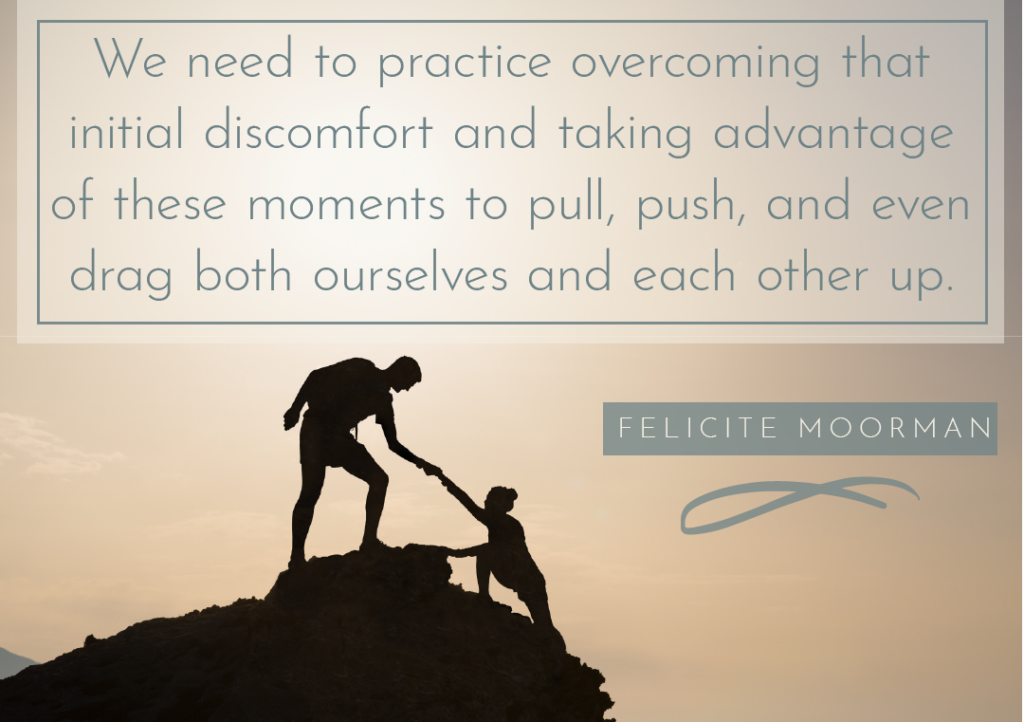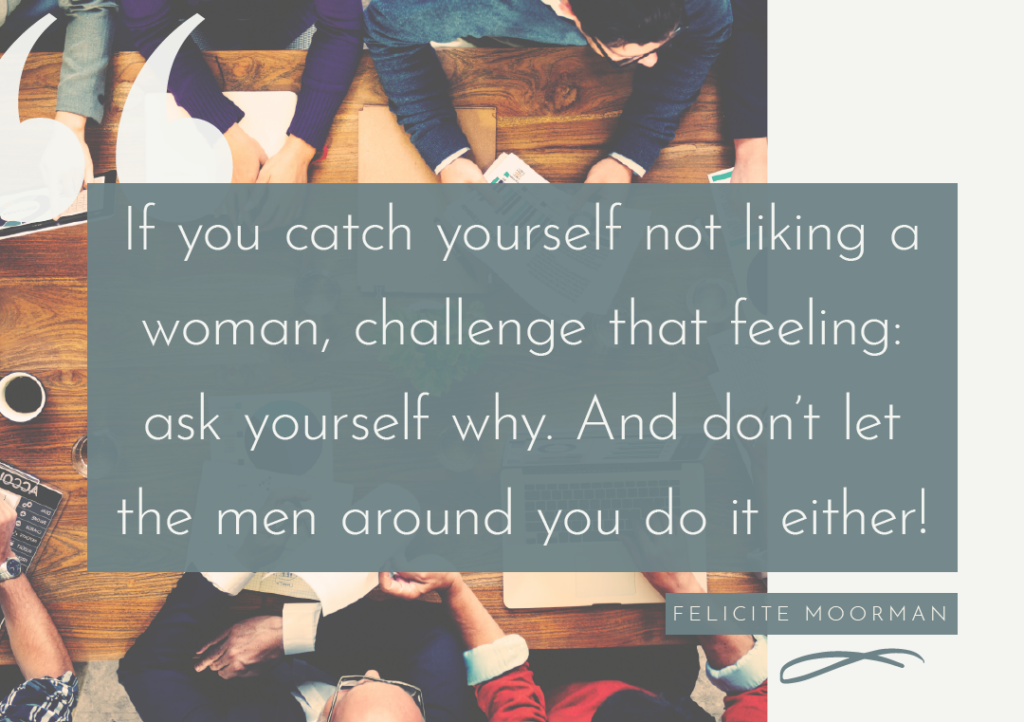Every day, I talk to people who are seeking to create change in their workplace but don’t know where to start. They want to make their office more inclusive and build an equitable gender balance, but they simply lack the tools to bring that dream to fruition.
A key factor in creating this gender equality is the amplification of women’s voices. This can only happen if each of us takes responsibility and actively practices that amplification.
Self-promotion, and the promotion of others, is a skill that doesn’t come naturally to many people. It especially doesn’t come naturally to women.
If you are a woman, and the thought of speaking up about yourself or another woman inspires feelings of discomfort or shame, that’s normal! I’ve broken it down into five specific strategies that should make it a lot easier.
Learn to Recognize Your Own Success
When men succeed, they often talk about their innate talents that created that success. Women, on the other hand, tend to use words like luck.
Keeping your head down and working hard isn’t enough. Women need to start taking credit for their accomplishments and promoting their own abilities if they want to find success in the corporate world.
Wharton and Harvard recently did research on how men and women rate themselves in self-evaluated employee performance reviews and found a notable gender gap. Women tended to rate themselves significantly lower, even when their work was objectively better.
The participants in the study took a short exam and then were asked to score their own performance on a scale of 1-100. Although the women actually performed slightly better on the exam, men gave themselves on average a 61, while women gave themselves a 45. This gender gap persisted in every version of the study they conducted.
Many women don’t want to come off as overly confident, for fear of being disliked. However, this tendency for women to undervalue themselves only serves to make the gender gap wider.
Hiring bias is a huge problem, and many hiring managers and employers rely upon subjective self-assessments like the one used in that study. Remind yourself that by refusing to promote yourself as a woman, you’re only worsening the systemic gender bias we are trying to dismantle.
Even once you’ve recognized the necessity of it, actively practicing self-amplification can be uncomfortable at first if you’re not used to it. The key is changing the way you look at it. Tell yourself that you aren’t bragging or being arrogant, you’re simply asking for the recognition that you deserve.
Men are good at self-promotion. They’re encouraged from a young age to promote themselves whenever possible. Women aren’t taught those same skills, and many are forced to learn them later in life. Talk to the men around you, and don’t be afraid to ask them for advice.
When it comes to succeeding as an entrepreneur or in a corporate workspace, women are faced with enough challenges and roadblocks. Refuse to add to those challenges by failing to recognize how great you really are!
Have an Elevator Pitch Prepared
If you’re an entrepreneur, you probably already have an elevator pitch to promote your business or product. It’s a practice that’s been popular for decades.
I know that when I meet somebody, in about 30 seconds, I’ve told them who I am and what I do; what if you’re not me? I think it’s past time to rethink the elevator pitch. The concept of being able to sell yourself in a few words is equally as important if you’re not running your own business.
Put yourself in this scenario: you’re not the CEO and you meet the CEO in an elevator or at the coffee machine. When they ask you how you’re doing, what do you say?
If your answer is “I’m fine,” that’s an opportunity missed!
Have your elevator pitch prepared beforehand, or wing it if you’re good: “I’m great, we just accelerated Lisa by twenty-two percent based on this marketing campaign I’m leading!” or “Awesome, we increased rents by twenty-five dollars a month because of technology we adopted on my recommendation!”
Take every chance you get to make sure that your leadership knows who you are, what you do, and why you matter to the company.
To have a perfect elevator pitch, it’s important to take note of your own accomplishments, and understand what your best skills are. When you achieve something or complete a project, add it to this personal inventory. Save it all up, and don’t miss another opportunity!
One trick is to take time every day, or every week, to quickly jot down what you feel your biggest accomplishments were. Once you become comfortable with being proud of your achievements, it’s easier to become comfortable sharing them with others.
All you need is one line about how awesome you are. We’ve recognized that self-promotion is a thing women sometimes don’t like to do, and preparing that line ahead of time is a great and easy way to get into the habit of it.
Promote the Women Around You
Along with amplifying your own voice, the other key factor to accelerating change is listening to and promoting the women around us.
Both men and women have to speak up and acknowledge the women they work with. Even, and especially, if it’s in a room full of people. We need to bring them to the table and give them the recognition they deserve.

Like self-promotion, this doesn’t come naturally to many people. There’s an inspirational speaker that I highly recommend named Mel Robbins who authored a book titled the Five Second Rule. Robbins discovered that we have just five seconds to act on a goal before our fears and worries get in the way of our instinct.
When you see an opportunity to lift yourself or another up in a way that would otherwise be uncomfortable for you, tell yourself that you have five seconds to respond. Only five seconds before your lizard brain, the one that keeps us alive, triggers your prefrontal cortex and shuts it down.
We need to practice overcoming that initial discomfort and taking advantage of these moments to pull, push, and even drag both ourselves and each other up.
Men, this is where male advocacy comes into play! If you’re a woman, and you have men in your life that you’re close to, ask them for help. Encourage them to advocate for you and the women around you.
If you see something, say something, even if it’s in front of a bunch of people, about your appreciation of another woman’s work. This takes practice! We should be constantly reminding ourselves on a regular basis to support each other in these ways. Get into the habit of looking for every available opportunity to uplift another woman.
I would like to challenge you to take advantage of the next one of those opportunities that you see. Yes, there’s a little bit of discomfort there, but it’s necessary discomfort. Just remind yourself, you only have five seconds!
Destroy the Likability Paradox
It’s really hard to lift someone up if you don’t like them as a person. We all have people in our lives that just get on our nerves for one reason or another. However, when we run into a woman that we inherently dislike, I think it’s time to start asking ourselves why that is.
I’m speaking of something called the likability paradox. This is a gender issue that affects specifically women. It basically goes like this: when women are successful, they are perceived as less likable.
I work and bust and crush and talk all day long. I try to be pretty nice. And the more work I do, the less likable I am. Think about that! What a terrible catch-22.
It’s heart-wrenching to work for years, achieve everything you set out to achieve, only to have people not like you because you did it.

Madeline Heilman, Professor of Psychology at NYU, has conducted multiple studies on the inherent gender bias in our workplaces. She showed that while men are praised for helping out around the office, women get no acknowledgment for completing the same tasks. When men don’t help out, no one really cares, but women who do the same thing are perceived as lazy and rude.
Question the ways you think about and discuss the women you work with. If you catch yourself not liking a woman, challenge that feeling: ask yourself why. And don’t let the men around you do it either!
If you hear it, call them on it. “What is it about her you don’t like? Give me some specifics. Is it something I should watch out for?”
Only by choosing to speak up can we start to dismantle these biases that are ingrained in our society. If you are leadership, implement bias training for both men and women. Build a workplace environment that doesn’t penalize women just for being successful.
We need to quash this likability paradox now. Imagine if everyone made the conscious decision not to look at women this way! It’s time to lift each other up, instead of putting each other down.
Work Together!
Don’t do any of this alone. It’s hard work, we have a lot of it, and we need it to happen pretty fast.
Recognize that it’s impossible to achieve true change by yourself. Women need to talk to each other behind the scenes. If you have an issue with a male coworker, ask around; you may not be the only one. Bounce ideas off of each other, make plans, and execute them.
This can be subtle! For example, under the Obama administration, the women working in the White House felt that their male coworkers were speaking over them in meetings, so they got together and formed a plan to practice amplification.
When one of them made a key point in a meeting, other women would repeat it. If a woman was interrupted or her idea was not credited, another woman would fall right behind her and say something like “I think her idea is really great and we should spend more time on it.” Eventually, the men in the room started to take notice and made a point to call on women more often.
This is something that a couple of women at the table can do together, without coming in guns blazing and raising a lot of red flags – we’ll save that for later.
Another great option is creating an employee resource group. This is a really effective strategy for fostering a more inclusive office environment. Get together with other like-minded people, have lunch, share stories, and create strategies.
By establishing a mission and specific goals for your group, you can empower your coworkers to actively work toward accelerating change.
Find an executive sponsor for your group if you can. However, if your leadership doesn’t buy into this, that’s okay too; have lunch offsite if you have to! The important part is supporting your coworkers, and knowing that they will support you. None of us should have to do this work alone.
At the end of the day, if we want to truly accelerate change, the keyword is practice. For every one of these strategies, we need to practice, practice, practice. It’s time to get good at seeing and seizing every opportunity, not just for ourselves, but for each other.
Don’t wait; any one of these strategies could be implemented tomorrow! The next time you recognize an opportunity to amplify your own voice or that of another woman, close your eyes, take a deep breath, and force yourself to take action. That is the only way to create the better workplace, and the better world, that we deserve.

